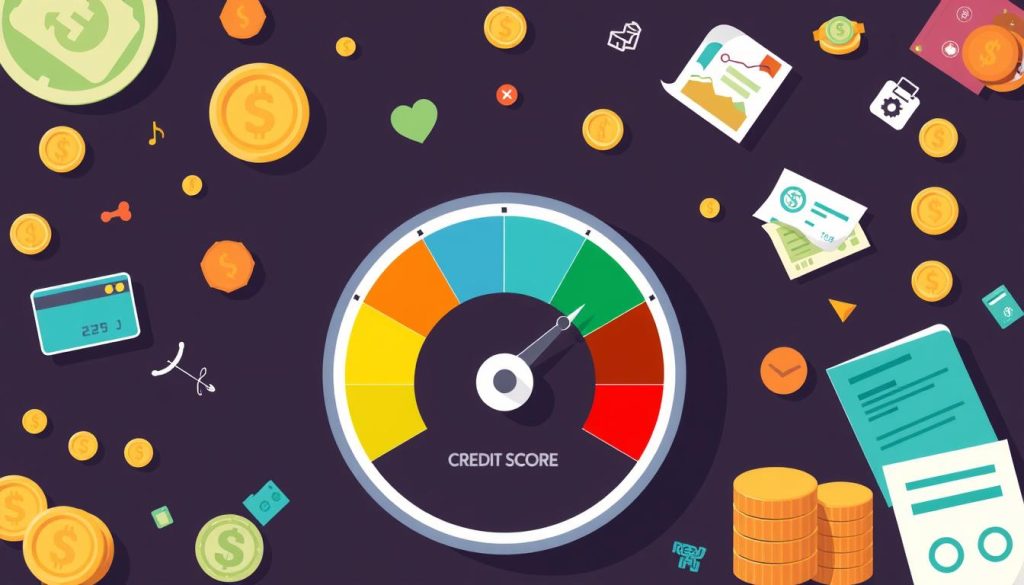In this day and age, knowing how to help your financial assessment is critical. A decent FICO rating implies better credit terms. It assists you with getting credits endorsed and brings down the financing costs you pay.
By following the right tips, you can further develop your FICO rating. This leads to saving money on interest over time. It’s a shrewd method for dealing with your funds.
We will explore how credit scores affect loan rates. We’ll learn how to make our credit profile better. This knowledge helps us manage our finances well.
Understanding Credit Scores and Their Impact on Loan Rates
It is key in the money related world to Grasp FICO appraisals. These scores show how great we are at dealing with our funds. They are determined by credit departments utilizing various variables. A fair score goes from 300 to 850, taking into account how well we handle our cash.
What is a Credit Score?
Monetary evaluations are included a couple of critical parts. These include:
- Payment history, which accounts for 35% of the score
- Credit utilization, representing 30%
- Length of credit history, making up 15%
- Types of credit used, contributing 10%
- Recent inquiries, which account for the remaining 10%
Together, these parts give a full view of our financial habits. This assists loan specialists with perceiving how reliable we are.
How Loan Rates are Affected by Credit Scores
Moneylenders use financial assessments to sort out the bet of progressing to us. A higher score means lower interest rates. This shows why keeping a good credit score is so important. Indeed, even little changes in rates can accumulate after some time.

How to Improve Your Credit Score for Better Loan Rates
Many individuals need to help their financial assessment for better advance rates. The first step is to check our current credit status. Knowing where we are helps us find what needs work and how to reach our financial goals.
Assessing Your Current Credit Status
To check our credit status, we really want to get reports from Equifax, Experian, and TransUnion. Taking a gander at these reports assists us with seeing what’s influencing our scores, as late installments or high credit use. It’s common for people to miss errors in their reports, which can hurt their scores. Spotting these problems lets us fix them early.
Implementing Effective Credit Score Improvement Tips
After we know our credit circumstance, we can begin further developing it. Good ways to do this include:
- Setting up updates for charge installments to keep away from late expenses.
- Rectifying mistakes using a loan reports expeditiously to improve our scores.
- Increasing credit limits responsibly to reduce credit utilization rates.
By doing these things, we can quickly raise our credit score. This leads to better loan rates later on.

Strategies for Boosting Your Credit Score
To further develop our financial assessments, we can utilize a few methodologies. These remember covering bills for time, diminishing Visa adjusts, and staying away from an excessive number of new credit applications. By following these means, we can pursue better financial soundness.
Paying Bills on Time
Taking care of bills on time is vital to a decent FICO rating. It shows we’re financially responsible. To help, we can set reminders or automate payments. This keeps our payments consistent and boosts our credit scores.
Reducing Credit Card Balances
Keeping credit card balances low is important. Try to keep them under 30% of your total limit. This improves your credit utilization rate, a critical part of your score. Paying down debts regularly helps achieve this and boosts your financial health.
Limiting New Credit Applications
While new credit can be needed, we should be careful. Each application can lower our score due to hard inquiries. Limiting new applications helps protect our credit and keeps our score high.
Long-Term Loan Rate Optimization Strategies
When we talk about long-term loan rate optimization, it’s all about building good credit habits. One smart move is to have a mix of different credit types. This mix, like credit cards and personal loans, shows lenders we can handle various accounts well. It not only raises our credit score but also helps us get better loan rates later on.
It’s also important to stay updated on credit laws and practices. Keeping an eye on new rules and standards helps us manage our finances better. Plus, checking our credit reports often helps us spot and fix any mistakes quickly.
If we hit a financial bump, it’s crucial to rebuild our credit wisely. Using secured credit cards and credit-builder loans can help us slowly boost our score. These means assist us with building areas of strength for a set of experiences, which is key for our drawn out monetary wellbeing. By adhering to these great credit rehearses, we make ready for a superior monetary future.